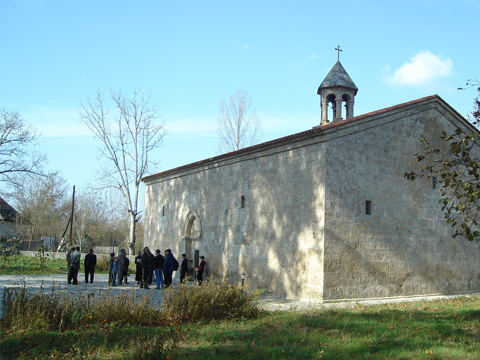Meet Udis, ancient Albanians descendants

By Nigar Orujova
A true wealth of Azerbaijan that can impress every visitor is kaleidoscopic diversity of religious and nationalities coexisting in peace in this honorable South Caucasus country.
You have already heard about harmonious living of Mountain Jews, Molokans in the country as well as mysterious Lahij and Khinalig villages.
Do you want to try it yourself? Then Nij village, located in Gabala region, should be your destination.
Here you will find Udis - the first ethnic group to adopt Christianity in the Caucasus.
Udis are considered to be descendants of Caucasian Albania. The Udi tribe was one of the most powerful tribe within 26 tribes of the Albanian state, with their faith, their Bible, their language and script writing.
Belonging to the Eastern Orthodox Church, these people were mentioned in the works of ancient authors, including Herodotus, Strabon, Pliny, and Ptolemy.
Udis occupied large territories from the shore of the Caspian Sea to the Caucasian Mountains, on the left and right banks of the Kura River. They lived a sedentary lifestyle, engaging in land-farming, handicrafts and livestock breeding, fishing and gardening.
As in their past, Udis are today involved in farming, cattle breeding, rice cultivation, sericulture, horticulture, poultry farming, craftsmanship and viticulture.
The long-liver Udis have round faces and fair or brown hair. The hospitable and respectful people typically have large families. Their attire is similar to that of other ethnicities in the Caucasus.
The Udis' folklore is very diverse. They have different games, lyrical and heroic songs, dances, legends and stories relating to domestic lives. Many Udi ceremonies, rites, and calendar days are linked to farming. Some of their old beliefs and faith in the moon are still alive.
After the conquest of the Caucasian Albania by Arabs, the number of the Udis and their territories gradually reduced. Though the number of Udis people started decreasing, they managed to preserve their identity. Leaving mostly in Nij village, Udis now make up about 4,000 of the village's population, preserving their language and religion.
The influence of living for centuries in the territories of Turkish and Persian is now expressed in Udis' folk traditions and culture.
Udis all speak the native language as well as Azerbaijani and Russian languages. There are schools for Udi children in the village, as well as Azerbaijani schools. Unique Udi language is a direct descendant of the ancient Albanian language of first millennium AD.
The most sacred places in the village are recently-reconstructed the Jotari church of St. Eliseus, Gyoy and Bulun churches.
There are four trees as plane old as the 17th century Jotari church. Villagers say that residents of every neighborhood planted plane trees here and local people still see them as a memory of their ancestors.
Last year, the village celebrated the 1700th anniversary of the official adoption of Christianity as official religion in the Caucasian Albania. Nowadays, Udis are free in their region however the situation was different 20 years ago.
Over 170 years ago, the Albanian church was transferred to the Armenian Gregorian Church, but the Udis refused to attend the Gregorian church to preserve their language, culture and loyalty to their Albanian church. They started saying prayers at home. Moreover, during the atheistic Soviet period, worships were halted.
Udis went through a long and very painful time, when they resisted the Armenian influence that wanted to destroy everything associated with the Albanians and Udi, everything that was not related to Armenians. The western Udi even left Nagorno-Karabakh, which is now under Armenian occupation, and settled in Nij.
The peace came to this pious people after Azerbaijan gained independence. The Albanian-Udi Christian community was registered in 2003, and the work began on the restoration of churches and worshiping.
Today, Udis are considered successors of the rich religious and cultural heritage of the Apostolic Autocephalous Church of Albania. Along with churches, two mosques have been built in the village.
Azerbaijan pays special attention to the preservation of multi-nationality across the country and restoration of the Albanian-Udi church is one example of this commitment.
Those who are interested in this ancient and exciting history of prosperity, persecution and rising should visit this village.
Here we are to serve you with news right now. It does not cost much, but worth your attention.
Choose to support open, independent, quality journalism and subscribe on a monthly basis.
By subscribing to our online newspaper, you can have full digital access to all news, analysis, and much more.
You can also follow AzerNEWS on Twitter @AzerNewsAz or Facebook @AzerNewsNewspaper
Thank you!
